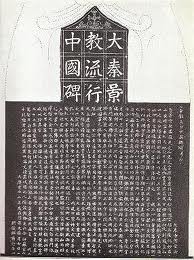The 'Nestorian Stone' or Church of the East Stele - presented by Martin Palmer

|
Presented by Martin Palmer, Secretary-General of the Alliance of Religions and Conservation and Broadcaster.
With our penultimate object, Martin Palmer takes us back many centuries to consider what is normally seen as a very modern phenomenon: Christianity in China. The object is the Church of the East stele - also known as the Nestorian Stone. Dated 781 AD it tells the story of the arrival and spread of Christianity in China in beautiful Chinese poetry and includes a fascinating version of the Gospel working with Christian, Daoist, Buddhist and Confucian imagery and terminology. In terms of Christian history, the Stele is deeply significant. It conveys a form of Christianity that taught Original Goodness not Original Sin. It was a non-power based form of early Christianity unlike the Roman Empire and Christianity and as such offered a completely different way of being Christian; it had women ministers, was largely vegetarian and refused to own slaves - unlike, for example, Buddhist monasteries in China. The Stele also has the best preserved texts from the Church of the East, which from the 5th century to the 13th century was two to three times bigger in terms of numbers than the Church of the West and spread at its height from present day Iraq through Iran, the Arabian Peninsula, East Africa, Iran, the Central Steppes, Afghanistan, India, China, Mongolia to Japan and Korea. Yet, its history is almost unknown in the West. Martin Palmer will explore the Stele's history, its theology and the radical challenge it presents to how we think about Christianity. Martin discovered the only remaining building from the Church of the East, built in 650 AD, and this is now to be the centre-piece of a new Chinese-Government funded 'Museum of Christianity in China' to open in three years at a cost of roughly £110 million. Martin will explore why the Stele, and this building, are of such significance to contemporary China. Martin Palmer is a theologian, author, broadcaster and environmentalist. He is Secretary-General of the Alliance of Religions and Conservation (ARC), a secular non-governmental organisation founded by His Royal Highness Prince Philip in 1995 to help faiths to develop environmental and conservation projects based on their own beliefs and practices. He is the author of more 20 than books on religious and environmental topics such as Faith and Conservation, Travels through Sacred China, The Atlas of Religions and has edited many books including The Times Atlas of The History of World Religions. His work on sacred sites worldwide has won awards and his book Sacred Britain has been a best seller. He advises UNESCO on World Heritage sites and helps the World Monuments Fund with protecting endangered sacred sites. He is also a renowned Sinologist and is one of the foremost translators of ancient Chinese texts, having published translations on the Tao Te Ching (sometimes spelt Dao de Jing) I Ching (I Jing), Chuang Tzu (Zhuang Zi) and Kuan Yin. His translation of Chuang Tzu was chosen for the Penguin Classics lists. He has also translated all the early Christian texts in Chinese, dating from the Tang dynasty (618 - 907 AD) in his book The Jesus Sutras. Martin frequently appears on radio and television, and is a regular contributor to the BBC. In 2007 he was appointed as a co-chair with United Nations Development Programme on the programme of Long-term Faith Commitments to a Living Planet. He is also the Director of the International Consultancy on Religion, Education and Culture (ICOREC), which specialises in religious, educational, environmental and development issues. He studied theology at Cambridge, with a special emphasis on Chinese studies, and is a lay preacher in the Church of England. Thursday, 6th September in Deddington Parish Church.
|
|
An introduction from Martin Palmer.
|
|
Audio only of "The 'Nestorian Stone' or Church of the East Stele" - presented by Martin Palmer.
|

